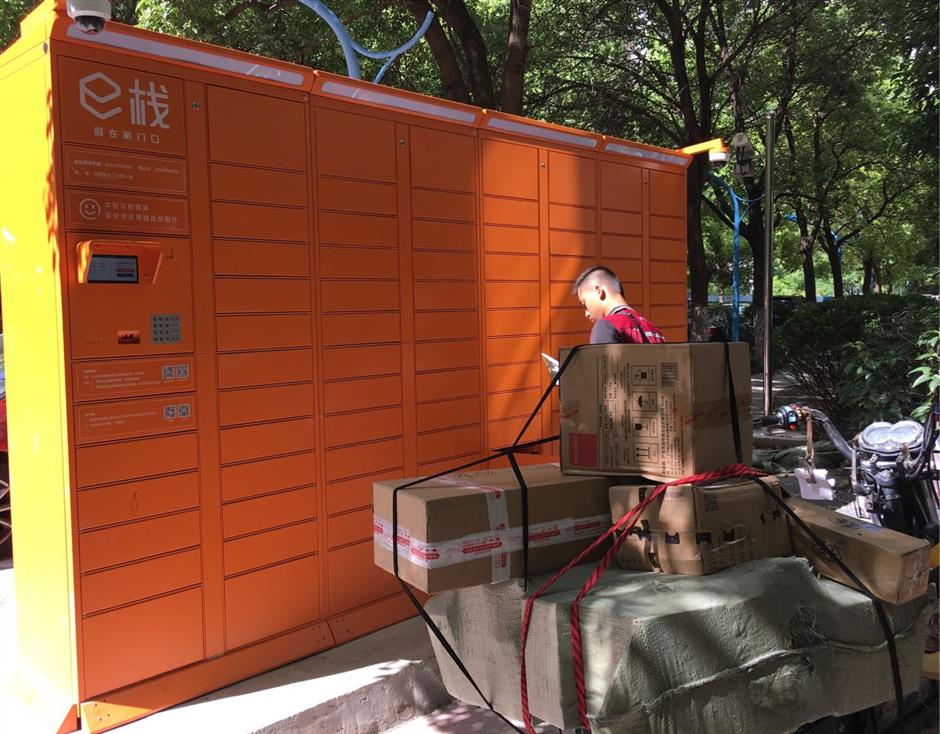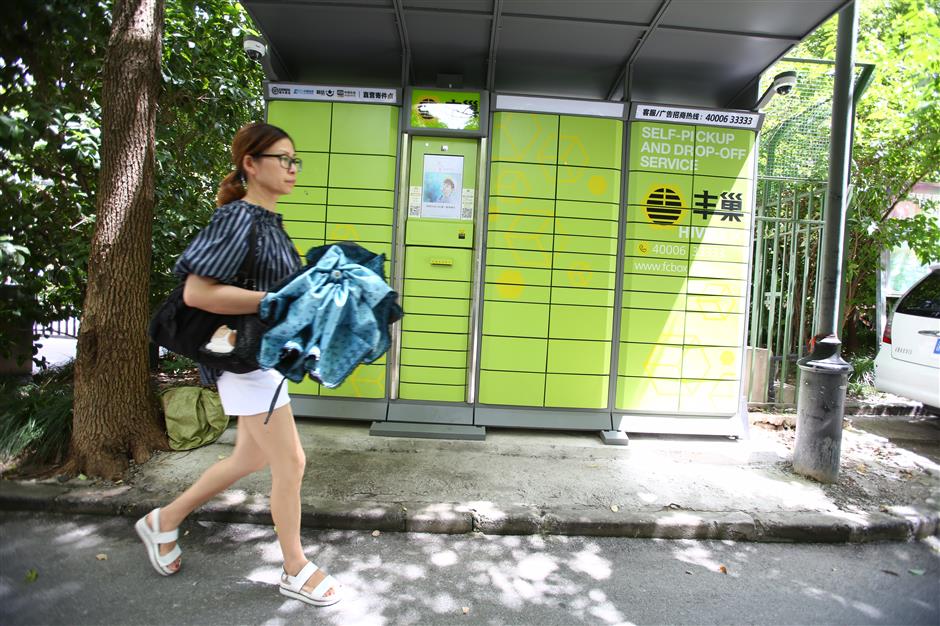Intelligent courier locker offers 'last mile' solution

A delivery man prepares to put in a parcel into the locker in a residential community in Liangcheng in Hongkou District.
Local courier firms and communities are widely promoting an intelligent parcel delivery locker as a new solution to the costly last mile of delivery.
The parcel lockers typically comprise 40 to 200 electronic lockers with a control unit that allows each compartment to be opened with the proper credentials. They are made available in different sizes to suit common parcels.
"They offer a very convenient and cost-effective alternative for customers and couriers to get parcels both delivered and received," said Zhang Jianhong, the property manager with the Carnival Garden, an international community in Gubei in Changning District.
The neighborhood with over 200 households, 30 percent being from abroad, has installed three such intelligent lockers in a central basement. Another two lockers with the brand Hive Box will be installed soon to meet the increasing demand, Zhang said.
Customers said it is more convenient to pick up from the lockers when they are not at home and they don't have to be bothered by constant phone calls from deliverymen, he said.

Many local communities have installed the intelligent parcel delivery locker as a new solution to the costly last mile of delivery.
Several leading courier giants — SF, Yunda, STO, ZTO and logistics infrastructure provider GLP — have joined together to set up Hive Technology Co. to develop and promote the Hive Box locker, currently the largest player in the Chinese market.
Over 5,000 such intelligent lockers have been installed in Shanghai and some 60,000 nationwide, according to SF Express, which led the cooperation scheme.
"Some 98 percent of the users said the Hive Boxes make them feel more convenient according to a survey," said Li Wenqing, chief marketing officer with the Shenzhen-based Hive Technology Co.
More Hive Box will be installed in local communities like Gubei Carnival Garden as well as other major Chinese cities to cap the demands, Li said.
Previously, one of the top issues that Zhang and other apartment managers face is handling resident packages and parcels, especially during the various online shopping festivals.
Last year’s Singles Day shopping frenzy on November 11 racked up a record-setting US$17.8 billion in revenue for Alibaba Group alone.
Zhang said many local community managements have refused to accept packages for customers due to liability, package storage and significant management time.
As well as in the upmarket communities, the intelligent lockers are also popping up in old residential communities like the Liangcheng and Quyang areas in Hongkou District, the most populated region in downtown.
Nancy Liu, a white-collar working for a multinational company, said the smart locker in the neighborhood in Liangcheng, where she lives, has played an indispensable part for her online shopping experiences.
"It makes me feel safer to pick up the parcels from the lockers rather than open the door to a strange person, especially at night," Liu said.
While the lockers are being lauded by customers, the deliverymen also see them as a more efficient and convenient delivery option.
"I don't have to climb up and down," said Chen Deping, a deliveryman with TTK Express from southwest Sichuan Province. For the past six months he has been deliver parcels in the Gubei area.
"It also solves the problem that many customers are unwilling to open their doors to us, especially the foreign customers," Chen said. He said sometimes it is difficult to talk with foreign customers via phones, but with the lockers, he can simply drop it for them to pick up later.
"More importantly, we don't have to take liability for the theft of the parcel left on the doorstep when the customers are not at home," said another courier man surnamed Jiang, who works for YTO Express.
However, some of their colleagues said they preferred to deliver the parcels to the customer's door because the locker will charge them by about 0.5 yuan (7.5 US cents) for accepting each parcel.
Chen Xiaopeng with Best Express who takes charge of parcel delivery in an office building in Jing'an District said he can earn only 1 yuan for delivering each parcel but has to pay half of that if he uses the lockers.
"If it is a free service, of course I'm willing to use it," Chen said. According to a survey, the average monthly salary for 75 percent of the deliveryman is around 3,000 yuan. Only 5 percent of the courier employees earn over 6,000 yuan per month.
While the intelligent lockers are spearheading the industry growth, there should also be some improvements, said Cao Lei, director with the China e-commerce Research Center.
"Deliverymen must get approval from the customer before dropping the parcels in the lockers," Cao said. "Otherwise they must deliver the parcels to the homes according to the nation's courier market management regulation."
The operational panels should also have English and other foreign languages for the convenience of foreign users, said the property manager Zhang.

A worker picks up a parcel at an office building in Jing'an District.
Hive Technology has been designing an English language system and will launch it in the near future, Li said. Software is updated once every two weeks automatically to improve the service, he added.
It is estimated a record 43.8 billion parcels will be delivered nationwide this year, or 120 million parcels daily, according to the State Post Bureau of China. The number of daily parcels could reach 280 million in 2020, according to the bureau.
Driven by that increase, the number of intelligent lockers is expected to rise to 350,000 nationwide by 2020, when up to 40 percent of the parcels will be delivered or picked up through the lockers, according to the bureau.
It is also a global trend. In Germany, DHL has 250,000 lockers and 20,000 parcel shops, and in France 60 million parcels — accounting for 20 percent of all e-commerce generated deliveries — are sent to pick-up points or lockers.
In the United States, legislatures in five states have passed a law to allow unmanned delivery robots to make their way over bumps and curbs to deliver parcels. Analysts say this might set a new trend for the parcel delivery.















